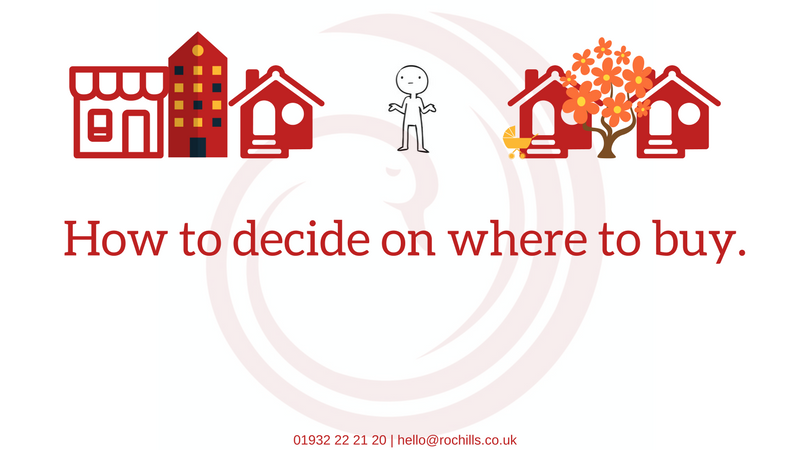Before you look for a property, you need to decide on the area. It could be the most important decision you make: get it wrong and you will either be unhappy with where you live, or face the costs of moving again
If you want to move to a new home close to where you already live, there is little to decide. But if you want to move to a different part of town, or across the country, then deciding the area is more difficult. It can take time to get to know an area well enough to know whether you would like to live there, and many of the issues will not be apparent from just visiting.
The UK housing market is highly localised, and only by thoroughly researching individual areas and streets can you ensure you don’t make a mistake, and confidently make the snap decision needed to put in a bid quickly if lots of people are interested in your chosen property.
Choose an area you can afford
First of all, you need to choose an area where you can afford to live in the sort of property you want to live in. If you want a whole house and don’t have £3m, don’t look at Chelsea. Decide roughly how much you want to spend. Look on property websites to see what you can get for that amount in different areas.
To state the obvious, city centres have a tendency to be more expensive than the countryside; the South tends to be more expensive than the North; and London is obviously much more expensive than pretty much anywhere else – more than three times as expensive as the North East of England or Wales.
Decide what type of property you want
- Decide the minimum number of bedrooms you would need.
- Do you want your own front door, or are you happy with a conversion flat?
- There will naturally be compromises – you might be able to afford a flat in a more popular area, but a whole house in cheaper area.
Then spend your evenings cruising property websites to find out if the areas you are interested in have the sort of properties you want at a price you can afford.
Choose what type of area you want to live in
There are a number of things to consider:
- Do you want to be in a vibrant area, with lots of life?
- Do you want to be somewhere more rural? Do you want a laidback lifestyle or will you get bored?
- Do want to be able to walk to shops, or are you happy having to get in a car to get the essentials?
- How long is the commute to work? How close do you want to be to family and friends?
- Are there community groups around?
- Check out the crime, schools, transport links and council tax rates.
Are there employment opportunities?
If you are already employed, where will you work? What happens if you decide to leave your current job? Ensure you leave room for career flexibility. Don’t move to a one-industry town if you are about to leave the industry. Ambitious people may require access to larger centres of employment and job markets.
If you are moving from the city to the countryside, consider that you may want to adapt your work-life balance or spend more time with your kids, all of which might require employment opportunities closer to home.
Spend time in that area…
Spend days wandering the area you are interested in. You will probably spend years there – it is really worth investing time to make sure you are happy where you end up.
If unsure, rent to test…
It is better to rent somewhere to be sure on the lifestyle, than buying and selling in distress a couple of years later.
The long term view…
Unless you plan to move again in a couple of years, take the long term view.
- Don’t move somewhere you will grow out of in a couple of years: move somewhere you will grow into.
- Those in the first half of their careers will hopefully earn more money each year, enabling you to grow into areas (and take on properties) that at first seem expensive. But do be realistic about your future earnings!
- Do worry about the long term value of your house: for many people it is their biggest asset, outstripping their pension.
- Cheap areas surrounded by expensive areas are likely to gentrify, unless there is a particularly powerful reason they are cheap, such as bad housing, motorways, chemical plants or post-industrial wastelands.
- Fashionable areas that everyone is talking about may well have topped out, and have lower growth.
- A good value area, with good properties and decent transport connections, is a good bet because local house prices can take years to catch up with transport improvements.
- If a new transport connection has been announced to be opened some years in the future, property prices nearby are likely to rise above average until the transport connection starts operating. On the downside, big building works might cause disruption for some time or cause problems if you decide to sell.
Have kids – or are planning to start a family?
Then you will need to make sure you are moving somewhere suitable for family life.
- Good schools are vital – Ofsted’s website will tell you what they are like
- Local councils will generally tell you the precise catchment areas of their schools in recent years – vital to know if you want to make sure your children get into it
- Living where lots of other families already live is a good bet, and will ensure lots of facilities for families
- Is there lots of playing space?
Get to know the streets you want to live in…
Once you have chosen an area, drill down further – life can vary street by street, or village by village. Get chatting to the agents – they usually have really good insider information about the local areas.
If you are moving to a city:
- Five minutes walk to the bus stop doesn’t feel that different from 15 minutes the first time you walk it, but it does when you do the journey twice every working day.
- One side of a street could be in the catchment area of a school, and the other outside of it.
- In London, council tax can vary dramatically from one side of the street to the other.
If you are looking to buy in the countryside:
- How does this village differ to another nearby?
- Is there public transport?
- How far away are the good schools – are you prepared to drive that twice a day?
- And how long would it take you to get to work?
- Are you near a train station?
- Are you a gym fiend – if so, is there a gym nearby, or will you buy equipment?
For more advice or information call us on 01932 22 21 20 or visit our Walton on Thames Property community group on Facebook or subscribe to our YouTube channel for more tips like this.




